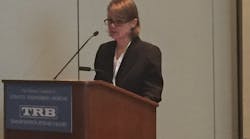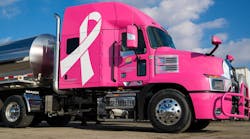WASHINGTON, D.C. A long-discarded tool for measuring in detail U.S. light, medium, and heavy truck trends, the Federal Vehicle Inventory and Use Survey (VIUS) may be brought back to life by the Bureau of Transportation Statistics (BTS) in partnership with the U.S. Census Bureau this February if the two gain enough funding to cover its costs.
Right now, the Census Bureau estimates the cost to conduct the survey would total $11.3 million over five years, with the price tag hitting around $2 million in the first year to cover start-up expenses.
During a presentation at the 97th annual meeting of the Transportation Research Board, Joy Sharp, assistant director of survey programs at BTS, said that the Census Bureau has committed $1 million in funding over five years to the VIUS re-start effort, while BTS has committed $500,000 for the next three years.
“We need two or three other agencies to commit $500,000 each,” she said. A final decision on whether to restore the VIUS is expected to be made in February, Sharp noted.
The federal government originally started the VIUS back in 1963 and began issuing an analysis of the data it collected every five years starting in 1967. It was discontinued in 2002 due to budget cuts, Sharp explained.
The VIUS was originally based on paper questionnaires mailed to a statistical sample of vehicle operators; some 130,000 vehicles, drawn from state motor vehicle registrations, made up the last VIUS conducted 15 years ago.
Sharp said the study was designed to examine the physical and operational characteristics of a wide range of trucks divided into specific categories: pickups; vans; sport utility vehicles (SUVs); single-unit commercial trucks with a GVW of 26,000 lbs. or less; single-unit commercial trucks with a GVW of 26,001 lbs. or more; and tractor-trailers.
The data gathered typically included make and model year, body type, engine displacement, fuel type, axle configuration, length, plus empty and loaded weight. Sharp said helped support legislative and rulemaking efforts, gauge the growth of transportation needs, calculate fees and highway spending allocations among others.
The data gathered by such studies can be surprising. Jim Brogan with Cambridge Systematics provided details on a two-year truck survey effort commissioned by California, the results of which are to be published this summer.
That survey, which collected data on 15,000 via electronic scanning devices connected to them voluntarily for a period of 21 days, discovered significant “deadhead mileage” among commercial trucks operating in the Golden State. The survey found that they were empty for 24% of the total mileage they covered and only partially loaded for 26% of the miles they traveled.
Brogan added that as part of the survey costs Cambridge paid $40 to $100 per individual truck to allow for the electronic scanner to be plugged into the vehicle, adding extra to that incentive if GPS tracking could be added to the device.



